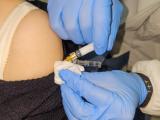May 25, 2007 (CIDRAP News) – Farmers, airlines, and salmon fishermen stood to benefit when Congress passed a modestly trimmed emergency spending bill yesterday, but pandemic influenza preparedness lost out.
The legislation, dedicated mainly to funding the military campaigns in Iraq and Afghanistan, was passed without $650 million in pandemic preparedness spending that had been included in an earlier version of the bill. The earlier bill was vetoed by President Bush because it set a timetable for starting a US withdrawal from Iraq.
The $120 billion bill was expected to get the president's signature as soon as today. It includes $99.5 billion for the Department of Defense, mostly for the war, with the remainder going for a long list of other needs, ranging from levee building on the Gulf Coast to relief for drought-stricken farmers and children's health insurance, according to a summary from the House and Senate Appropriations committees.
The funds are for activities through the rest of fiscal year 2007, which ends Sep 30.
The exclusion of the pandemic money doesn’t mean Congress won't appropriate anything for that purpose this year, but it does suggest that a considerable delay is likely, said Richard Hamburg, government relations director for Trust for America's Health, a public health advocacy group based in Washington, DC.
"This is going to delay completion of the initial commitment by the president to supply at least $7.1 billion in funding," he said, referring to Bush's request for pandemic preparedness funds in November 2005. "And we're certainly concerned about the fate of those dollars and whether they'll go into another vehicle."
The deleted $650 million included $625 million for vaccines, antivirals, other medical supplies, and diagnostic and surveillance tools, according to a text of the earlier bill that was vetoed (HR 1591). The sum also included $25 million to compensate individuals for any injuries caused by H5N1 influenza vaccines.
The final bill does include some money for avian flu, according to the appropriations committee summary: $161 million for foreign operations under the State Department and $13.2 million for research and monitoring by the Fish and Wildlife Service, Geological Survey, and National Park Service.
The final bill was the product of weeks of negotiations between House and Senate leaders and the White House, according to the Associated Press (AP). The president sought to remove many of the non–war-related items that House and Senate leaders had put in the earlier bill. The negotiators trimmed about $4 billion from the earlier version, but Bush accepted $17 billion more than he had requested, in return for the removal of a deadline for starting the Iraq withdrawal.
But it wasn't clear today exactly why the bulk of the pandemic funding was dropped. Inquiries with several House and Senate offices and public health organizations elicited no clear answers.
"There's a lot of discussion that it was coming from the administration," said Hamburg. "There's a lot of rumors flying around."
He speculated that, among other possibilities, someone in the Office of Management and Budget or elsewhere in the administration "might have made the call that there was less of a sense of urgency" about the pandemic money.
House Appropriations Committee Chairman David Obey, D-Wis., in an online statement about the spending bill, listed "pandemic flu protection for the country" as one of the country's urgent needs. He said the funding should have been retained in the final bill, but offered no explanation of why it was dropped.
Hamburg said Congress so far has provided about $6.1 billion of the $7.1 billion that Bush requested for pandemic preparedness in November 2005. The lawmakers appropriated $3.8 billion in early 2006, he noted.
Later in 2006, the administration requested between $2 billion and $3 billion for use in fiscal year 2007, he said. The upshot was that $2.3 billion was included in an emergency supplemental spending bill in 2006.
This year, Hamburg said, the administration requested about $1.1 billion for pandemic preparedness in its fiscal 2008 budget. About $870 million of that was listed as 1-year funding, designated for vaccines, antivirals, and diagnostics, he explained.
The Senate responded by putting $870 million in its emergency supplemental spending bill, while the House put about $970 million in its version of the bill, Hamburg said. A House-Senate conference committee later trimmed the amount to $650 million, including $25 million for vaccine injury victims. The bill at that point also included the $13 million for domestic avian flu monitoring and $161 million for foreign operations.
The compromise bill went on to draw a presidential veto over the Iraq withdrawal provision, and the pandemic money was dropped in the subsequent negotiations.
"I think the next step is to figure out why it came out and then think about what the other options are," Hamburg said. The first option is to have the funds included in the labor, education, and health funding bill for fiscal 2008, he added.
If the past is a guide, that could mean a long delay, Hamburg said. The regular health budget legislation for fiscal 2007 wasn't completed until February or March of this year, he explained.
Hamburg said much of the pandemic funding provided so far, including a majority of the state and local money, has already been spent. "In particular the state and local preparedness funds would not go past September 30, which is why a lot of groups, including us, are advocating for additional funds," he said.


















